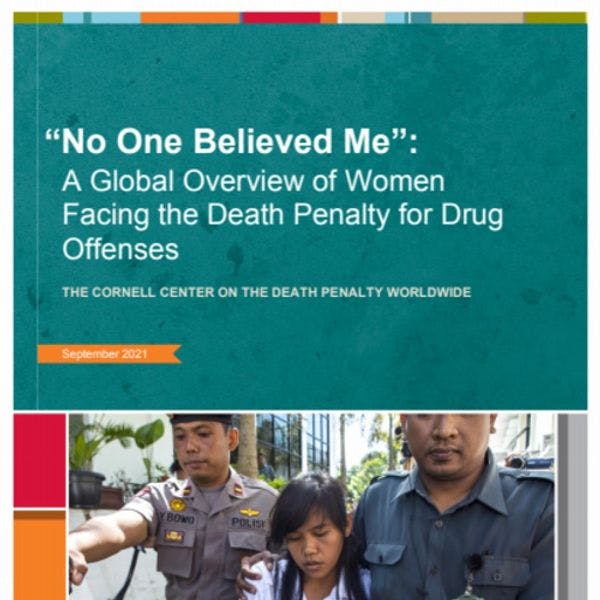"Nadie me creyó": Situación mundial de las mujeres enfrentando la pena de muerte por delitos de drogas
El Cornell Center on Death Penalty Worldwide y el HRI destacan las tendencias que caracterizan los impactos de género de la aplicación de la pena de muerte por delitos de drogas. Más información, en inglés, está disponible abajo.
By Cornell Center on the Death Penalty Worldwide and Harm Reduction International (HRI)
The punitiveness of the international drug control system has been largely responsible for the growth of the world’s female prison population in the last three decades. In countries that punish drug offenses with death—a violation of international law—a large majority of the women on death row were convicted of drug-related offenses. This report examines the circumstances that lead women to commit or be charged with drug offenses and the impact of gender bias on the criminal process they experience.
Drug convictions account for a minority of the world’s death sentences but a majority of capital convictions in a small number of so-called ‘retentionist’ death penalty states. Capital drug laws are most entrenched in states that resist the global trend towards abolition, concentrated in Asia and the Middle East. Many of these states do not publish information on their use of capital punishment. Moreover, gender-disaggregated and gender-specific data frequently does not exist. Nevertheless, this study examines the available information, notably for countries such as Indonesia, Malaysia, China, and Thailand. Our analysis reveals the following trends relating to women facing death for drug offenses:
Foreign nationals are overrepresented.
- Economic insecurity.
- Manipulative or coercive relationships with male codefendants.
- Refusal to consider genderspecific mitigation.
- Reliance on stereotypical gender narratives.
- Reliance on legal shortcuts to conviction and sentence.
- Lack of access to adequate interpreters and lawyers.
This report relies on primary and secondary data sources and is the first effort to aggregate global data surrounding drug offenses and the death penalty as these phenomena relate to gender. Based on our findings, we have issued a series of urgent recommendations to governments, lawmakers, the judiciary, prison authorities, and civil society. We hope that this report spurs further research and attention to the plight of women facing death sentences for drug-related offenses.
Descargas
Regiones
Perfiles relacionados
- Harm Reduction International (HRI)
